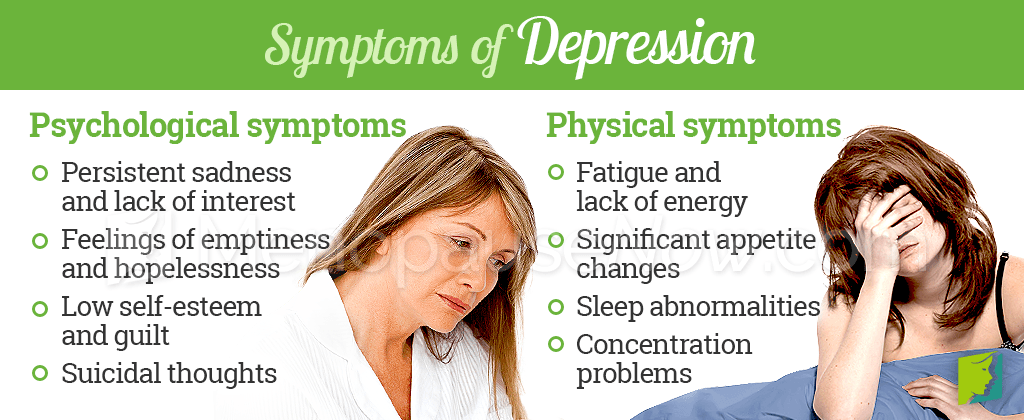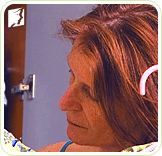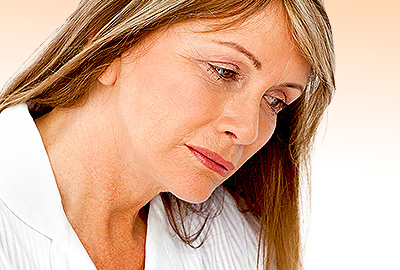Depression is more than simply feeling sad. There are several signs and symptoms that can help doctors diagnose an individual with depression. In order for a diagnosis to occur, an individual must display a number of signs and symptoms indicative of depression. Symptoms can be broken into three categories: physical symptoms, emotional symptoms, and behavioral symptoms.
In order for a person to be diagnosed with clinical depression, at least five of the below symptoms must be present for at least two consecutive weeks. At least one of those symptoms must be persistent feeling of sadness or loss of interest or pleasure. Read below to learn about the different physical, emotional, and behavioral symptoms of depression.
Physical Signs and Symptoms of Depression
There are typical physical symptoms that go along with depression. Below is a list of the common physical symptoms:
Fatigue. This includes feeling mentally or physically drained, as well as problems with concentration and memory.
Decreased energy. Even small tasks are demanding, and the sufferer has a general lack of interest in past social activities, hobbies, or sex.
Overeating. This is defined as food cravings, significant weight gain, and an increase of more than 5% of body weight in a month.
Appetite loss. This manifests as a general disinterest in food, significant weight loss, and a decrease of more than 5% of body weight in a month.
Insomnia. This is marked by changes in sleeping patterns, difficulty in getting to sleep at night, waking up in the middle of the night, or early-morning wakefulness. This can also be a disorder on its own.
Excessive sleeping. Oversleeping (also known as hypersomnia) and a difficulty in getting out of bed in the morning are common during depression.
Physical ailments. Headaches, cramps, persistent aches and pains or digestive problems that do not ease even with treatment may be present.
Continue reading to learn more about the emotional and behavioral symptoms of depression during menopause.
Emotional Signs and Symptoms of Depression
Many people only associate the below emotional symptoms with depression. They often are the easiest to identify because most people consider some of these symptoms to be synonymous with depression, although the other symptom categories are just as important in diagnosing depression.

Behavioral Signs and Symptoms of Depression
Last, there are some behavioral symptoms that help to characterize depression. The primary behavioral symptoms are:
Behavioral symptoms of depression

- Loss of interest in activities or hobbies once pleasurable, including sex
- Difficulty concentrating
- Difficulty remembering details
- Difficulty making decisions
- Neglecting responsibilities
- Failing to attend to one's physical appearance
Although there are several different signs and symptoms broken up into three categories, many people look for these 10 signs of depression when trying to determine if they may have depression:
The Top 10 Signs of Depression
Five of these symptoms must be present in order for a person to be clinically depressed, with at least one of the bolded symptoms present.
- Persistent feelings of sadness
- Fatigue
- Overeating or appetite loss
- Insomnia or excessive sleep
- Persistent aches and pains
- Feelings of hopelessness
- Irritability or restlessness
- Thoughts of suicide or suicide attempts
- Loss of interest in activities that were once enjoyable
- Difficulty concentrating
Continue reading to find out when to see a doctor for depression.
When to See a Doctor

Women entering menopause should seek professional help for their depression if the following symptoms occur:
- Depression continues for over a month
- Severe weight loss
- Neglect of family and self
- Self-harm
- Thoughts of suicide
Now that you are equipped with a clear understanding of the signs and symptoms of depression, click on the following link to learn about the causes of depression during menopause.
Sources
- Amin, Z. , Canli, T. & Epperson, C.N. (2005). Effects of Estrogen-Serotonin Interactions on Mood and Cognition. Behavioral and Cognitive Neuroscience Reviews, 4(1), 43-58. Retrieved from http://www.ncbi.nlm.nih.gov/pubmed/15886402
- National Institute of Mental Health. (2016). Depression. Retrieved May 9, 2016, from https://www.nimh.nih.gov/health/topics/depression/index.shtml
- Office on Women's Health. (2010). Menopause and mental health. Retrieved May 9, 2016, from http://womenshealth.gov/menopause/menopause-mental-health/
- University of Michigan Depression Center. (n.d.). Depression During Menopause. Retrieved May 9, 2016, from http://www.depressiontoolkit.org/women/menopause.asp



